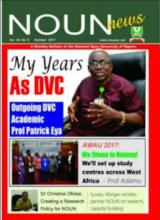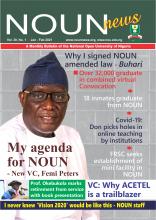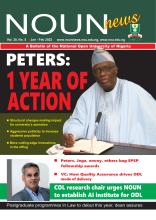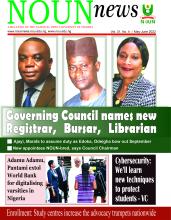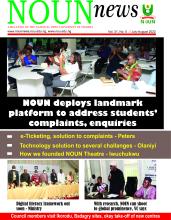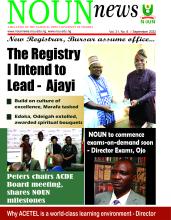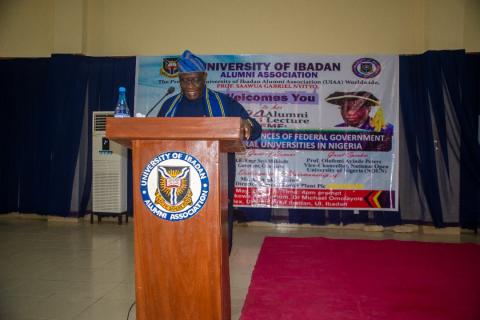
In a thought-provoking address delivered at the 2024 Alumni Lecture held at the University of Ibadan Alumni Association, Vice-Chancellor of the National Open University of Nigeria (NOUN), Prof. Olufemi A. Peters, a distinguished alumnus of the University of Ibadan, delved into the complex interplay between government policies and the Nigerian higher education system.
The lecture, titled: "The Unintended Consequences of Government Policies on Federal Universities in Nigeria," provided a critical examination of the impact of policy decisions on academic institutions and their stakeholders, shedding light on the challenges and complexities inherent in Nigeria's higher education landscape.
Peters began by acknowledging Nigeria's rich history of policy development and enactment, characterised by ambitious goals and noble intentions, as he highlighted a persistent challenge plaguing these policies—the gap between policy formulation and effective implementation.
Despite the government's stated commitment to policy execution, the NOUN VC argued that unintended consequences often undermine the intended objectives, particularly in the context of federal universities.
The lecture explored the multifaceted ownership of universities, emphasising their role as public institutions serving diverse stakeholders.
From society at large to students, faculty, government, donors, and alumni, each group contributes to the university's mission and success, as Peters underscored the significance of alumni engagement, advocating for their inclusion in university governance structures to enhance institutional effectiveness.
Highlighting the pivotal role of alumni, Prof. Peters outlined various ways in which alumni contribute to the growth and advancement of their alma mater: from networking and financial support to mentorship and advocacy, alumni serve as custodians of institutional legacy, driving progress and innovation.
He reflected on the evolving landscape of higher education in Nigeria, and traced the trajectory from traditional Humboldtian ideals to modern-day challenges of relevance and adaptation.
Peters highlighted shifts in ownership and instructional modes, emphasising the enduring commitment to scholarship and knowledge dissemination, exploring the tension between academic autonomy and societal relevance, and noted the increasing scrutiny universities face from the government and other stakeholders.
He delineated the multifaceted challenges confronting Nigerian universities, from funding constraints and infrastructure deficiencies to industrial actions, academic quality concerns, corruption, graduate employability, and examination misconduct, emphasising the urgent need for systemic reforms to address corruption, enhance governance, and bolster academic standards.
Exploring government intervention, he advocated for enhanced funding mechanisms to alleviate university challenges. He delineated funding sources and underscored the imperative for transparency and accountability in financial management.
Prof. Peters scrutinised two pivotal government policies—the Treasury Single Account (TSA) and the Integrated Payroll and Personnel Information System (IPPIS). While the intention was to streamline financial management and promote transparency, these policies inadvertently encroached on university autonomy, stifling academic freedom and hampering operational efficiency.
The lecture unravelled the unintended consequences of government policies on federal universities. Delays in fund disbursement, erosion of autonomy, and capacity-building challenges emerged as unforeseen outcomes, necessitating a nuanced approach to policy formulation and implementation.
Professor Peters began by contextualising the implementation of IPPIS in 2019, mandated by the Federal Government. While the objectives of IPPIS aimed at enhancing transparency and accountability in manpower planning and remuneration, its implementation faced significant challenges. University staff unions, notably the Academic Staff Union of Universities (ASUU), raised concerns regarding the inflexibility of IPPIS to accommodate the unique structures of universities and the erosion of university autonomy.
Enumerating the unintended consequences of IPPIS implementation, Peters highlighted issues such as data discrepancies, inadequate ICT infrastructure, delayed payments, and inflexibility in recruitment practices. He emphasised how these consequences adversely affected university operations, including academic staffing, research, and planning.
Professor Peters delved into the critical role of perceptions in policy implementation. He outlined how the attitudes, capacities, and organisational cultures of implementers influence policy outcomes, as well as the importance of transparent communication and stakeholder engagement in addressing concerns and improving policy effectiveness.
Contrary to initial perceptions of insensitivity, Peters acknowledged recent government responses to concerns raised by the university community. These include amendments to IPPIS allowing for the deduction of union dues, resolution of payment issues, and directives to exclude universities from IPPIS.
In light of the challenges posed by IPPIS and other government policies, Professor Peters proposed several recommendations. These include regular monitoring and evaluation, stakeholder engagement, flexibility in policy frameworks, data-driven decision-making, and transparent communication.
Drawing from a poignant allegory involving a bird, vine, and tortoise, Olufemi underscored the importance of tailored solutions to complex challenges. He emphasised that not all problems can be addressed with a standardised approach, advocating for nuanced responses to diverse needs and contexts.
Peters, however made a clarion call for collaborative action, urging stakeholders to transcend bureaucratic inertia and champion holistic reforms. He emphasised the need for critical engagement from all stakeholders in the policy process. He called upon alumni, policymakers, researchers, and civil society to collaborate in addressing the unintended consequences of government policies and shaping the future of the university system in Nigeria.
Meanwhile, the astute scholars lecture provided a comprehensive analysis of the challenges posed by government policies on federal universities in Nigeria, offering insightful recommendations and urging collective action towards a more responsive and effective governance framework in the education sector. As alumni, his call to bridge the gap between past legacies and future aspirations resonates, highlighting the pivotal role of informed discourse and collaborative efforts in driving positive change.
As the curtains fell on the 2024 Alumni Lecture, echoes of Professor Peters' impassioned plea reverberated, kindling hope for a brighter future for Nigeria's higher education landscape.
- Log in to post comments
- 82 views

